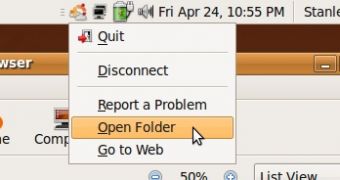Canonical has just released a new "cloud" service for all users: Ubuntu One starts today as an invitation-based Beta. There are two storage options momentarily: a free 2GB account and a $10/month 10 GB one. If you are familiar with services like Dropbox, Ubuntu One apparently does the same job.
The main features, as described on the official website, are: seamless integration and synchronization between multiple machines and a convenient web interface. But, while Dropbox works across all main platforms, the Ubuntu One application will exclusively be available for Ubuntu 9.04 operating systems. Of course, thanks to the web interface, files should be accessible (but not synchronized) from any other computer, the only requirement being an Internet browser.
If you want to subscribe for an Ubuntu One Beta invitation, you simply have to go to the Ubuntu One website, sign in with your Launchpad account, and wait for the confirmation email. After receiving the invitation, further, step-by-step installation instructions are also available on the website. Canonical recommends a fully updated system before proceeding with the installation. Adding the PPA is the first step and is easily done by clicking an apt-url-enabled "Add PPA" button; the actual installation is done in the same way, this time by clicking the "Install" button on the same page. The client will then be available in the Applications --> Internet menu.
When first opening Ubuntu One, a website will launch, allowing you to add your computer to the synchronization list for your Ubuntu One account. This step has to be done for every computer on which you install the application and want to be kept synchronized. A handy icon will also be placed in the notification area, letting you access your files either locally or through the web interface.
Ubuntu One is obviously a great idea, but it is currently facing a strong competition in the form of Dropbox. Though the free accounts have identical space limits for Ubuntu One and Dropbox, you will get five times Ubuntu One's space with Dropbox if you apply for a $10/month plan: 10 GB - Ubuntu One vs 50 GB - Dropbox. Moreover, as I said before, Dropbox is available for Linux, Mac OS and Windows.
Regardless, Ubuntu One is surely a service worth watching, and I'm sure Canonical has some aces up its sleeve to make its new project much more appealing than the competition. The upcoming O'Reilly Open Source Convention talk that will be given by Stuart Langridge of Canonical hints at Ubuntu One as also being a development and application testing platform.

 14 DAY TRIAL //
14 DAY TRIAL //